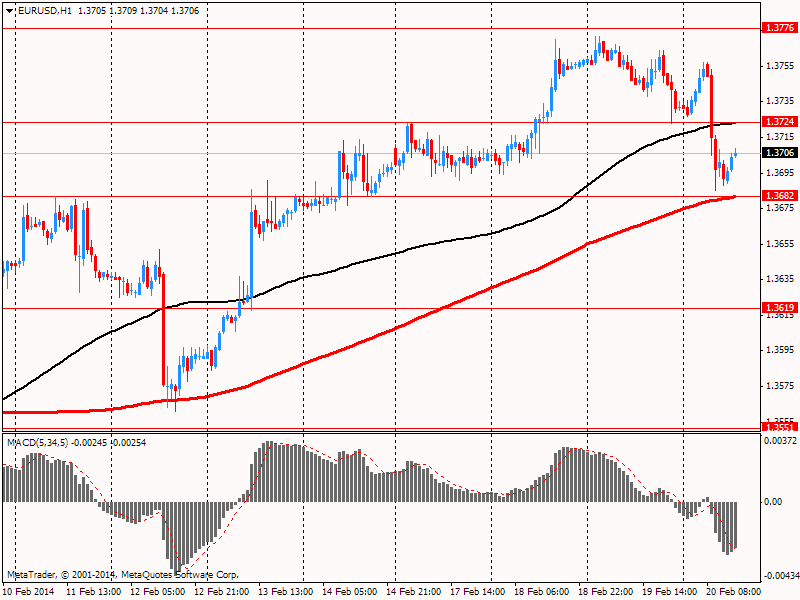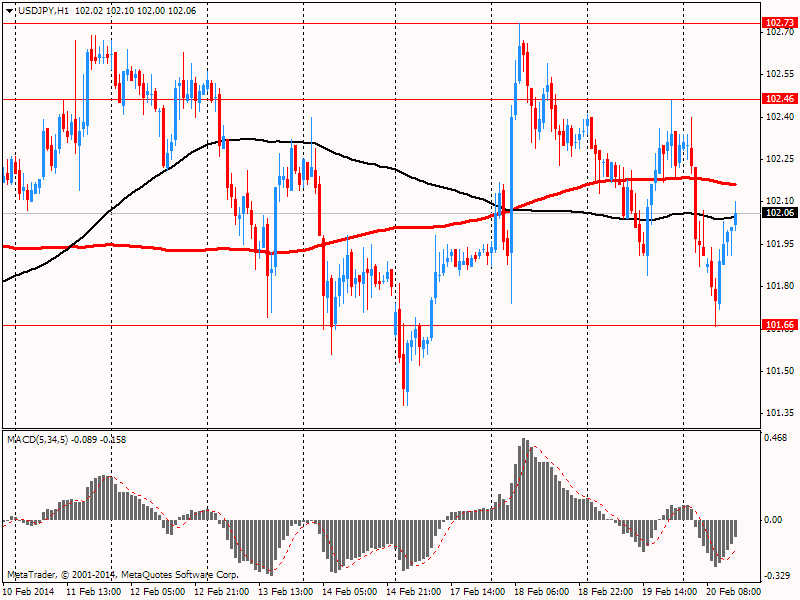- Analytics
- News and Tools
- Market News
- European session: the euro fell sharply against the U.S. dollar
European session: the euro fell sharply against the U.S. dollar
Data
01:45 China HSBC Manufacturing PMI February 49.5 49.4 48.3
07:00 Germany Producer Price Index (MoM) January +0.1% +0.3% -0.1%
07:00 Germany Producer Price Index (YoY) January -0.5% -0.8% -1.1%
07:00 Switzerland Trade Balance January 0.50 1.47 2.59
07:45 France CPI, m/m January +0.3% -0.3% -0.6%
07:45 France CPI, y/y January +0.7% +1.1% +0.8%
07:58 France Manufacturing PMI (Preliminary) February 49.3 49.6 48.5
07:58 France Services PMI (Preliminary) February 48.9 49.5 46.9
08:28 Germany Manufacturing PMI (Preliminary) February 56.5 56.4 54.7
08:28 Germany Services PMI (Preliminary) February 53.1 53.4 55.4
08:58 Eurozone Manufacturing PMI (Preliminary) February 54.0 54.2 53.0
08:58 Eurozone Services PMI (Preliminary) February 51.6 51.9 51.7
11:00 United Kingdom CBI industrial order books balance February -2 6 3
Rate of the euro fell sharply against the U.S. dollar , which was associated with the release of data on PMI. The decline began after a report showed that private sector activity in France has declined at a faster pace in February , which stood at the head of a marked deterioration in service sector activity . On a seasonally adjusted composite index of activity that assesses the effectiveness of the manufacturing and service sectors , fell to two-month low in February , and was 47.6 points, compared to 48.9 points in January . Recall that the value of this index below 50 indicate a contraction in activity in the sector. Meanwhile, it became known that the purchasing managers' index for the manufacturing sector fell to 48.5 in February from 49.3 in the year. Economists expected the index to rise to 49.6 . At the same time , the activity indicator for the service sector fell to 46.9 , compared with 48.9 in January. Expectations were at 49.5 .
Pressure also provided data for the euro area , which showed that the private sector economy continued its expansion in February , increased this streak to eight consecutive months, but showed weaker results than predicted by many economists . According to the report , the composite index , which measures the efficiency in the manufacturing sector and services totaled 52.7 points in February , which was slightly lower than January's 31 -month high at 52.9 points . Economists had expected the figure was 53.1 points . Studies also that the Purchasing Managers Index for the manufacturing sector fell to 53 points in February to 54 points in January . Expectations were at the level of 54.2 points . Meanwhile, the activity indicator in the service sector rose to 51.7 from 51.6 at the beginning of the year. Economists expected the index to rise to 51.9 .
Yen continues to be traded higher against the dollar, the aversion of investors into safer assets after the fall of the stock market of Asia. Negative on the stock market part of the publication of disappointing statistics on Chinese production. As it became known , the Chinese manufacturing index fell again in February , continuing progress on reducing the territory , reaching a seven-month low , and that was due to a fall in new orders , suggesting that the economic recovery is losing momentum .
On a seasonally adjusted preliminary purchasing managers index from Markit / HSBC, which measures activity in the manufacturing sector fell to 48.3 points in February , compared to 49.5 points in January . Economists had expected the index to fall to the level of 49.4 points . The index currently remains below 50 points for the second month in a row and is at its lowest level in seven months .
Demand for the Japanese currency support standby output of statistical data on inflation and U.S. employment . According to the median forecast of economists , inflation may slow down , pointing to problems in the recovery of the world 's largest economy . It is expected that the CPI in January to slow to 0.1 % , whereas the previous value was at 0.3% . Individual employment report could show reduction of initial applications for unemployment benefits .
The Swiss franc fell markedly against the dollar, which has been associated with risk aversion . Could not help franc even positive trade balance . As it became known , Switzerland 's trade surplus rose sharply in January , driven by an increase in exports of chemical and pharmaceutical products . This information was voiced today by the Federal Customs Administration Switzerland. According to the report , the trade surplus rose last month to a level of 2.59 billion Swiss francs , compared with a surplus of 521 million Swiss francs in the month of December , which was revised upward 503 million data also showed that exports grew at a faster pace in January - by 2.5 percent, compared with an increase of 1.1 percent in December. We add that the export has been growing for the third consecutive month . On the other hand , imports decreased, which is fixed for the first three months. Imports fell 2.3 percent after rising 1.5 percent in December.
EUR / USD: during the European session, the pair fell to $ 1.3684
GBP / USD: during the European session, the pair fell to $ 1.6630 , but then rose to $ 1.6674
USD / JPY: during the European session, the pair fell to Y101.66, then rose to Y102.10
At 13:30 GMT the United States will present the consumer price index for January, and 14:00 GMT - the index of business activity in the manufacturing sector in February. At 15:00 GMT Eurozone release indicator of consumer confidence for February, and the U.S. - Fed manufacturing index for February Philadelphia . At 23:50 GMT the meeting minutes will be published on the Bank of Japan's monetary policy in January .
© 2000-2026. All rights reserved.
This site is managed by Teletrade D.J. LLC 2351 LLC 2022 (Euro House, Richmond Hill Road, Kingstown, VC0100, St. Vincent and the Grenadines).
The information on this website is for informational purposes only and does not constitute any investment advice.
The company does not serve or provide services to customers who are residents of the US, Canada, Iran, The Democratic People's Republic of Korea, Yemen and FATF blacklisted countries.
Making transactions on financial markets with marginal financial instruments opens up wide possibilities and allows investors who are willing to take risks to earn high profits, carrying a potentially high risk of losses at the same time. Therefore you should responsibly approach the issue of choosing the appropriate investment strategy, taking the available resources into account, before starting trading.
Use of the information: full or partial use of materials from this website must always be referenced to TeleTrade as the source of information. Use of the materials on the Internet must be accompanied by a hyperlink to teletrade.org. Automatic import of materials and information from this website is prohibited.
Please contact our PR department if you have any questions or need assistance at pr@teletrade.global.


















